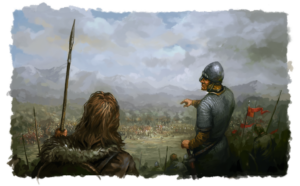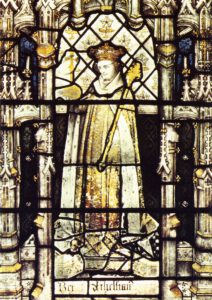The Battle at Brunanbuhr
937 AD

Prehistory
In 870, except Wessex, all Anglo-Saxon kingdoms were conquered by a Viking army. The King Ælfred of Wessex (Alfred the Great) and his descendants succeeded in gradually conquering these areas, however, they were no longer independent Kingdoms, but Counties of the newly formed England. England’s greatest opponents at the time were the Kingdoms of Alba, Strathclyde, which was linked to Alba by the MacAlpin dynasty and the Norman Jorvik, which was also conquered by Sitric Cáech in 921.

926 married Æthelstan, grandson Ælfreds and King of Wessex, his Sister with Cáech and raised after his death the following year claim to the Throne, for which he expelled the relatives of Cáechs and beat the Vikings at York. After his victory, he was recognized by the Kings of Alba, Deheubarth, Northumbria and Strathclyde and proclaimed King of England.
When Constantine II., King of Alba, was believed to be in breach of contract, Æthelstan made a successful invasion, after which Constantine allied with the King of Dublin Olaf Guthfrithsson and the King of Strathclyde Owen I. After defeating the Norman King Amlaíb Cenncairech (according to the Old Irish document), Guthfrithsson crossed the Irish Sea to unite his Army with the Constantines and Owens.
The Battle
Even if the sources are inaccurate, they uniformly describe a huge and bloody clash. In an Old english Poem of the Anglo-Saxon Chronicle it´s called:
Her Æþelstan cyning, eorla dryhten, beorna beaggifa, and his broþor eac, Eadmund æþeling, ealdorlangne tir geslogon æt sæcce sweorda ecgum ymbe Brunanburh. Bordweal clufan, heowan heaþolinde hamora lafan, afaran Eadweardes, […] […]Fife lægun on þam campstede cyningas geonge, sweordum aswefede, swelce seofene eac eorlas Anlafes, unrim herges, flotan and Sceotta. Þær geflemed wearð Norðmanna bregu, nede gebeded, to lides stefne litle weorode; cread cnear on flot, cyning ut gewat on fealene flod, feorh generede. Swelce þær eac se froda mid fleame com on his cyþþe norð, Constantinus, har hilderinc, hreman ne þorfte mæca gemanan; he wæs his mæga sceard, freonda gefylled on folcstede, beslagen æt sæcce, and his sunu forlet on wælstowe wundun forgrunden, geongne æt guðe. […]
Once King Æthelstan, Lord of the Counts, wrestlers of men, and also his brother Prince Edmund, eternal rum; fights in the battle with the sharpness of the sword at Brunanburh. They shattered the shield wall, smashed the wooden shields with axes, the sons of Edwards, […] […] Five lay dead on the battlefield, young kings slept skillfully by the sword, plus seven of Anlaf’s counts, innumerable of the army , Shipsmen and Scots. Then the ruler of the Northmen, obeying distress, was expelled to the bow of the ship; With little crew he set sail for the ship, the king went out into the murky waters to save his life. Similarly, the old man also turned to flee to his home in the north. Constantine, the gray-haired champion, could not rejoice over the great meeting; he was deprived of his relatives, his friends cut down on the battlefield, killed in battle, and his son he had wounded back on the battlefield by wounds, too young in battle. […]
In a Poem, the earliest 975 completed Æthelweards Chronicle it´s called:
wilce þa gebroþer begen ætsamne, cyning and æþeling, cyþþe sohton, Wesseaxena land, wiges hremige. Letan him behindan hræw bryttian saluwigpadan, þone sweartan hræfn, hyrnednebban, and þone hasupadan, earn æftan hwit, æses brucan, grædigne guðhafoc and þæt græge deor, wulf on wealde. Ne wearð wæl mare on þis eiglande æfre gieta folces gefylled beforan þissum sweordes ecgum, þæs þe us secgað bec, ealde uðwitan, siþþan eastan hider Engle and Seaxe up becoman, ofer brad brimu Brytene sohtan, wlance wigsmiþas, Wealas ofercoman, eorlas arhwate eard begeatan
The brothers, both together, king and prince, returned to their homeland, to the West Saxon country, boasting the battle. Behind them they left the corpses, left to the dark-robed, the black raven, the pointed-tailed and ash-colored, the white-tailed eagle, who consumed the carrion, the hungry, powerful hawk and the gray animal, the wolf from the forest. There has never been a major slaughter on this island, never again (and) never before have so many people been killed by the sharpness of the sword, so tell us the books and the ancient wise men, from the east came fishing and Saxons came across the to seek the vast seas of Britain, magnificent battle-works that conquered the Celts, proud lords who took possession of the land
The Annals of Ulster describe the Battle in a similar way:
A mighty War, lamentable and terrible, was cruelly conducted between the Saxons and the Norsemen. Many thousands of North Men with no numbers died while King Anlaf escaped with a few men. Although a large number of Saxons fell on the other side, Aethelstan, king of the Saxons, won a big victory.
A most detailed list of those killed in battle is contained in the Annals of Clonmacnoise and names several Kings and Princes.
| Anglo-Saxon Chronicle: | Brunandune |
| Aetherweard’s Chronicle | Brunanburh |
| Symeon of Durham | Brunnanwerc, Bruneford or Weondune |
| William of Malmesbury | Brunefeld or Bruneford |
| Scottish traditions | Duinbrunde |
| Welsh traditions | Brun |
| Annals of Clonmacnoise | plaines of othlyn |
| Egil’s saga Brunandune | Vinheithr |
The name Bromborough, a town in the Metropolitan Borough of Wirral, could be derived from the Old English Brunanburh. Although the Place could never be found with certainty, further evidence of Brunanburh’s connection with Bromborough was examined.
Many scientists today approve the term “near Bromborough”. Yet, in the past, dozens of other imaginable venues have been proposed, with discussions still ongoing between historians and philologists.
Consequences
Æthelstan’s victory assured him of England as a fully united kingdom. However, he was militarily weakened and the other parties were forced to secure their positions. The Battle of Brunanburh still has a large presence in Malmesbury, 320 km south of all proposed locations. Their residents fought for Æthelstan, who granted them five hides land (2.4 km ²) and made all free men. Also, the Warden and Freemen of Malmesbury, an organization still in existence today, were founded to commemorate Æthelstan in their ceremonies.
After the death of Æthelstan, his Body was transferred from Gloucester to Malmesbury and buried there.